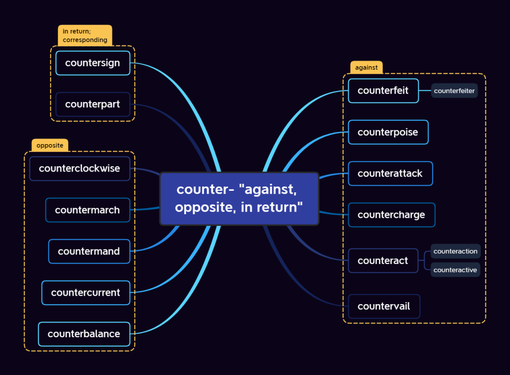一、opposite与counter当相反的讲时的区别和用法?
in contrast to 一般连用,是“与…形成对比,与…相比”的意思.opposite 名词:对立面/物;形容词:相反的,对立的,常与to 连用;介词和连词:在对面.opposite强调对立,in contrast 强调对比与区别,不一定对立
二、opposite和across from区别?
across from
词典解释:在...的对面
差异比较:首先是词性across为介词
例如:邮局就在那俱乐部对面
1.首先是 词性across为 介词,而cross为 动词。(cross 动词为“穿过,横穿”,名词为“十字, 十字路口”)。
2.当然across必须与through 区别开来。across为“横穿”,与“ 道路”交叉形成“十字”。而through为在 立体空间中的“穿过”。如:go through the forest“穿过森林”,go across the street “穿过大街”。 over则意为从物体表面上方穿过,并且不与物体接触。如:A plane flew over the house. “一架飞机飞过了房子。”
opposite
opposite 是一个英语单词,有对立面,对立的,相对,在…的对面的含义。
外文名
词性
形容词,介词,副词,名词
类别
英文单词
音标
英 [ˈɒpəzɪt]
adj.
对面的; 相对的; 对立的; [数学](顶、边等)对的
prep.
(表示位置)在…的对面; [数学](顶、边等)对的; 与…在一排; (表示方式)与…联合主演
adv.
在对面,对过
n.
对立面,对立物,相反的人[事物]、
Jenniehadsatoppositeheratbreakfast.
珍妮吃早餐时坐在她对面。
Allthecarsdrivingintheoppositedirectionhadtheirheadlightson.
对面开来的车都打着头灯。
RitterwasaverycomplexmanbutMariuswastheopposite,asimplefarmer.
里特城府颇深,而马里厄斯恰恰相反,是个心地淳朴的农民。
三、什么是介词举例说明?
①
汉语前置词、(英语:preposition,前置词,因为汉语介词一般前置),在语法里是一个用来表现一个字的文法功能的词汇或字缀。一般用在代词或名词性质的短语前面,和这些词合起来组成介词结构,以表示处所、时间、状态、方式、原因、目的、比较对象等的词,去掉后原句意思改变。
(1)表示时间,处所:从 自 自从 于 打 到 往 在 当 朝 向 顺着 沿着 随着
(2)表示方式:按 照 按照 依 依照 本着 经过 通过 根据 以 凭
(3)表示目的:为 为了 为着
(4)表示原因:因 由于 因为 只有
(5)表示对象,内容:对 对于 把 向 跟 与 同 给 关于
②
介词又叫做前置词,表示它后面的名词或代词(或相当于名词的其他词类;短语或从句)与其他句子成分的关系.介词通常位于名词或代词之前.
介词是一种虚词,不能单独做句子成分,只能用在一个名词、代词或相当于名词的结构之前,可以与后面的词一起构成介词短语.
in,on,with,by,for,at
into,within,throughout,inside,outside
from among,from behind等
③
英语介词表示词与词、词与句关系的词。常用介词:on、at、in、above、by、with等;合成类介词:inside、outside、onto、out of、within 等。
常用介词:on、at、in、above、by、with等;
合成类介词:inside、outside、onto、out of、within 等;
短语类介词:according to、ahead of、along with等。
1.含义
介词是一种用来表示词与词, 词与句之间的关系的词。在句中不能单独作句字成分。介词后面一般有名词代词或相当于名词的其他词类,短语或从句作它的宾语。介词和它的宾语构成介词词组,在句中作状语,表语,补语或介词宾语。
2.分类
1.常用简单介词:
about, across, against, among, after, at, behind, besides, beyond, by, concerning, beneath, between, despite, except, during, down, for, from, past, than, under, until 等。
2.合成介词:
inside, outside, onto, out of, within 等。
3.短语介词:
according to, ahead of, along with, as for, because of, be means of, due to, in spite of, on behalf of, owing to, with regard to 等。
3.介词与“……的”之关系
在英语学习中,一遇到“……的”,大家就会立刻想到’s 所有格或者of。实际上,在很多情况下,“……的”必须借助于介词才能准确表达。
● 美国的冬天→ the winter in America
● 停车场的入口→ the entrance to the parking lot
● 穿过森林的小路→ the path through the forest
● 鲁迅的著作→ the works by Lu Xun
● 水中的月亮→ the moon reflected in water
● 历史的见证→ the witness to history
● 对爱的渴望→ a longing for love
● 对我们不利的证据→ the evidence against us
● 阳光下的漫步→ a walk in the sunlight
● 追求名誉的女人→ a lady after fame
● 两人之间的争论→ an argument between the two persons
4.重要介词的重要用法
(1)from:此介词表示“to”相反的方向。
He came from London.
He went to London.
二词常搭配使用“from... to...”
We studied English from morning to afternoon.
He'll start from Beijing to Shanghai.
经典用法:
● 由于→ The girl is trembling from fear.
● 免除→ Tramps are always free from care. 流浪汉们总是无忧无虑。
● 分开→ The couple parted from each other at the airport.
● 由……制成→ The red wine is made from grapes. 红葡萄酒是由葡萄制成的。
由from引导的惯用法:
from far 从远处
from now / then on 从现在/那时起
from bad to worse 每况愈下
from time to time(occasionally 时而)
习语:
She comes to visit me from time to time.
(2)out of:表示与"into"相反的语意。
He will be out of town.
I stepped out of the dark room.
out of+ 名词 (= lack, to be without 用完,用光)
He went to the shop because he was out of paper.
四、instead是什么意思?怎样使用?
instead的用法:
1.instead是副词,只能单独使用。基本意思是“代替”,可依据上下文灵活翻译,有时甚至干脆不译。instead可位于句首,连接上下句。通常是上句先否定一种情况,再以instead引出下句,提出相反的情况。
2.instead也可位于句末,可用于两个独立的句子,也可用于并列句的后一句中,还可用于带有状语从句的主句中,这时常译为“反之”,“相反”。
3.instead of是短语介词,其后可接名词、代词、动名词,有时也可接形容词、动词不定式、介词短语等。instead of前后两部分的意思一般是一正一反,可灵活译为“(用…)代替…”“(是…)而不是…”“并非”“反而”等。
4.instead一般与of连用作为介词词组,后面可接名词和代词意外的词,如形容词,副词,动词和介词。instead 可以是形容词,一般放于句首或句尾。
5.注意instead of和without的区别,两者不要混用。一般情况下,用人,事,行为去代替另外的人,事,或行为时,用instead of。表示人,事,行为不和其他的一起时,用without。扩展资料instead 读法 英 [ɪn'sted]美 [ɪn'stɛd] 作副词的意思是:代替;反而;相反短语:1.go instead 代某人去2.drink beer instead 改喝啤酒3.laugh instead 反倒笑了4.take one's class instead 代某人的课例句:1.My husband asked why I couldn't just forget about dieting and eat normally instead.丈夫问我为什么就不能忘掉节食而正常吃饭。2.They raised prices and cut production, instead of cutting costs.他们提高了价格,减少了产量,而没有削减成本。

